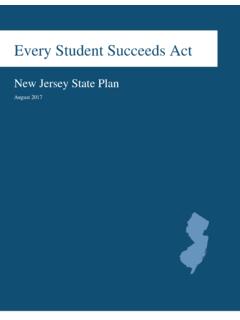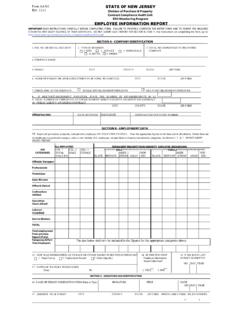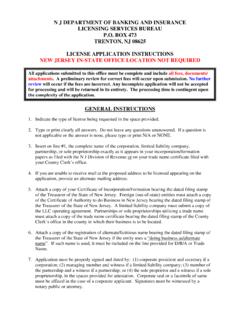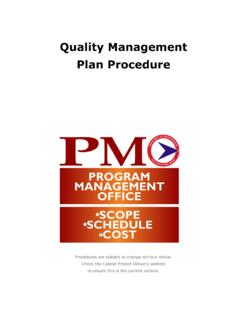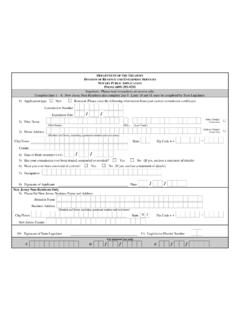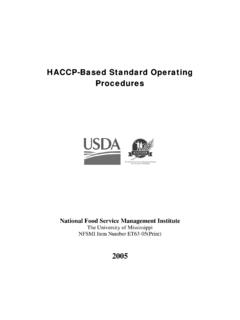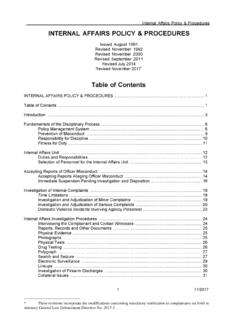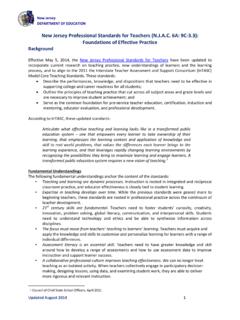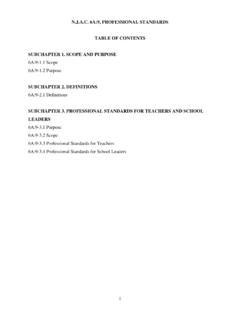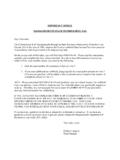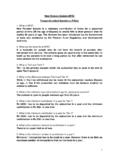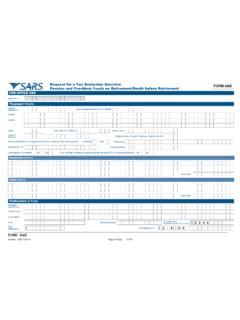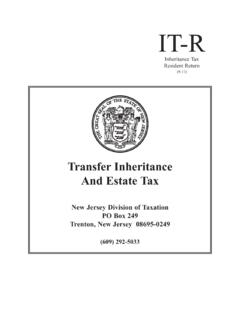Transcription of GIT-1 - Pensions and Annuities - New Jersey
1 Rev. 12/17 1 Tax Topic Bulletin GIT-1 Pensions and Annuities Introduction This bulletin explains how to report pension and annuity income on your New Jersey Income Tax return. It also describes the income exclusions qualified taxpayers can use to reduce their New Jersey taxable income. The forms, schedules, and worksheets used in this bulletin to illustrate return completion are those for Tax Year 2017. Thus, the forms and amounts shown in the examples may not reflect current information in subsequent tax years. Important Any reference in this bulletin to a spouse also refers to a spouse who entered into a valid same-sex marriage in another state or foreign nation and a partner in a civil union (CU) recognized under New Jersey law.
2 Changes for Tax Year 2017 Qualified taxpayers can exclude more pension and other income on the New Jersey return. The increased exclusion amounts are being phased in over a four-year period. For Tax Year 2017, the exclusion amounts are up to: $40,000 (married/CU couple, filing joint return); $30,000 (single, head of household, or qualifying widow(er)/surviving CU partner); or $20,000 (married/CU partner, filing separate return).This document is designed to provide guidance to taxpayers and is accurate as of the date issued. Subsequent changes in tax law or its interpretation may affect the accuracy of this publication.
3 General Information pension and annuity income is taxable and must be reported on your New Jersey Income Tax return. In some cases, the taxable amount of pension or annuity you show on your New Jersey return may be different than the taxable amount for federal income tax purposes. This is because you may have to use a different method to calculate the taxable amount for your New Jersey return than the method you use for federal income tax purposes. All State and local government, teachers and federal Pensions , and Keogh Plans are treated the same way as employee Pensions and Annuities from the private sector.
4 Amounts received as early retirement benefits and amounts reported as pension on Schedule NJK-1, Partnership Return Form NJ-1065, also are taxable. This publication is current for the 2017 tax year and has not been updated to include changes for 2018 pension and Annuities Rev. 12/17 2 Social Security/Railroad Retirement Benefits/Disability Social Security and Railroad Retirement benefits are exempt from New Jersey Income Tax and should not be reported as income on your New Jersey return. Payments from a public or private pension plan as a result of total and permanent disability also are exempt.
5 However, if an individual retired before age 65 on a total and permanent disability pension and continues to receive pension payments after reaching age 65, the disability pension is treated as an ordinary pension beginning at age 65. Military Pensions If you are receiving a military pension or survivor s benefit payments, the military pension or survivor s benefit is exempt from New Jersey Income Tax regardless of your age or disability status. Do not include such payments on your New Jersey return. Military Pensions are those resulting from service in the Army, Navy, Air Force, Marine Corps, or Coast Guard.
6 This exemption does not apply to civil service Pensions or Annuities , even if the pension or annuity is based on credit for military service. Most military Pensions and survivor s benefit payments are received from the Defense Finance and Accounting Service, while a civil service annuity is received through the Office of Personnel Management. For more information on military Pensions , see Tax Topic Bulletin GIT-7, Military Personnel. Individual Retirement Arrangements (IRAs) An IRA is a personal savings plan in which you set aside money for retirement. Taxable amounts withdrawn from an IRA are reported on the same line of the New Jersey tax return as taxable Pensions and Annuities .
7 Residents also should report the excludable amount on the same line as excludable Pensions and Annuities . If you receive payments from an IRA, see Tax Topic Bulletin GIT-2, IRA Withdrawals, for information on how to calculate the taxable and excludable portions of the withdrawal for your New Jersey Income Tax return. For information on Roth IRAs, see Technical Bulletin TB-44. Do not use the methods described here for calculating the taxable and excludable portions of a withdrawal from a pension or annuity for an IRA withdrawal. Part-Year Residents Any person who became a resident of New Jersey or who moved out of this state during the year is considered a part-year resident.
8 A part-year resident files a New Jersey Income Tax resident return that covers the period of residence in New Jersey and reports only the income he or she earned or received while a resident here. Part-year residents must prorate all exemptions, deductions, credits, and exclusions (including the pension and other retirement income exclusions) to reflect the period covered by the return. For more information, see Tax Topic Bulletin GIT-6, Part-Year Residents. Nonresidents pension and annuity income received by a nonresident for work performed in New Jersey is not taxable under the New Jersey Gross Income Tax Act.
9 If your only income from New Jersey sources is pension or annuity income, you do not need to file a New Jersey nonresident return. However, if you have other income from New Jersey that is taxable to a nonresident ( , wages, business income, gain from sale of real property in New Jersey ), you are required to file a New Jersey Income Tax Nonresident Return (Form pension and Annuities Rev. 12/17 3 NJ-1040NR) and report any pension or annuity income in Column A along with your other taxable income. Withholding Tax and Estimated Tax New Jersey residents who receive pension or annuity income can ask the payer to withhold New Jersey Income Tax from these payments.
10 If you want to have New Jersey Income Tax withheld, complete , Certificate of Voluntary Withholding of New Jersey Gross Income Tax From pension and Annuity Payments. Indicate the amount of tax to be withheld, and give it to the payer of the pension or annuity. Federal civilian retirees can elect to have New Jersey Income Tax withheld from their federal pension payments. Federal retirees who want to take advantage of this option should call the Office of Personnel Management, the agency that oversees federal Pensions , at 1-888-767-6738 or visit Voluntary New Jersey withholdings also are permitted for retirees from the uniformed services.
